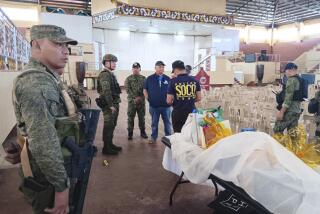Police Follow Clue in Bali Bombing to Nearby Island
- Share via
WANASABA, Indonesia — WANASABA, Indonesia -- An identity card found at the scene of a car bombing in Bali more than a week ago leads to a remote village in the middle of rice paddies and coconut groves.
Mohammed Fawazi, 20, is said to have lived here in the back of a two-story schoolhouse on the eastern side of Lombok island.
He hasn’t been seen since the Oct. 12 blast ripped through the heart of a Balinese resort town, killing and wounding hundreds, many of them young Australians.
People here acknowledge that police have been to the village to ask questions. However, few are willing to tell a reporter that they knew Fawazi, or where his relatives live.
One man who said he was a distant relative claimed to have heard from Fawazi’s brother since the terrorist attack on Bali, which is just west of Lombok.
“Fawazi and his brother went to Bali for a few days for fun,” said the man. “He was standing outside the Sari Club. His brother went off to do something else. When he came back, the bomb had gone off.”
But before the man could say more, someone shouted at him and he hurried off, adding, “We don’t know if he is alive or not.”
Officials have detained no suspects and have revealed little about who might have committed the attack or how it was carried out.
“We are getting a lot of information from the local papers that say someone saw people running away after the bomb, probably because they were running in fear,” said Michael Spinks, a spokesman for Australian police, who have joined the investigation. “We have to try to eliminate which ones were running away before the bomb, which ones were running away after the bomb.”
On Monday, investigators released some of their findings.
They said two bombs went off. The one in front of the Sari Club, where most of the casualties took place, consisted of 110 to 330 pounds of an ammonium nitrate mix. At another location, Paddy’s Irish Club, about a pound of TNT was used, said Brett Swan, another spokesman for Australian police.
The bomb in front of Paddy’s was the first one, said Brig. Gen. Edward Aritonang of the Indonesian national police.
But officials have not yet answered other questions, including whether the explosions were set off by suicide bombers or by remote control and whether there was any connection with a smaller blast about the same time near the honorary American consulate nearby.
Investigators said they have interviewed about 67 witnesses in Bali. At least four of them have been undergoing intense questioning and have not been allowed to go home, police said.
Fawazi’s late father and his cousins were respected leaders of an Islamic school here that has hundreds of students. One said Fawazi came to it often. Another said he had gone to Japan to work. No one wanted to comment on the Bali bombing.
Indonesia, a sprawling archipelago of 17,000 islands, could be a fertile recruiting ground for Islamic militants.
Police are still waiting to question Abu Bakar Bashir, who has been identified by authorities as the leader of the extremist group Jemaah Islamiah, a charge that Bashir denies.
Authorities accuse Bashir of helping to plan a series of church bombings on Christmas Eve 2000 that killed 19 people across Indonesia and of participating in a failed plot to assassinate President Megawati Sukarnoputri last year.
Bashir was admitted to a hospital Friday, complaining of exhaustion and respiratory problems. He was arrested Saturday but remained in the hospital.
Authorities think Jemaah Islamiah had a role in the Bali bombings, but Bashir has not been charged in the case.
Bashir is thought to be a close associate of Riduan Isamuddin, an extremist better known as Hambali who is thought to be a Southeast Asia liaison for Al Qaeda.
“It’s illogical that Bashir says he doesn’t know about the bombing in Indonesia,” said Matori Abdul Jalil, Indonesia’s defense minister, citing Bashir’s suspected contacts with Hambali. “Hambali is the vice president of Abu Bakar Bashir. Hambali’s involved in many terrorist acts in Indonesia.”
Last week, authorities said the site of the Bali bombing would be reopened by the middle of this week. On Monday, they pushed the date back to November, giving investigators more time.
“I wish the government would catch the bad guys quickly and punish them with a slow and painful death,” said Made Suartaya, an accountant at a Balinese hotel whose brother and cousin were killed in the blast. “That way they would know how we feel.”
More to Read
Sign up for Essential California
The most important California stories and recommendations in your inbox every morning.
You may occasionally receive promotional content from the Los Angeles Times.













